Rewrite the following C program using only C language so tha
Rewrite the following C program using only C language so that the code looks different but still does the same thing. Here\'s what the program does.
Now this is the C code to be rewritten only in C.
#include
#include
#include
#include
#include \"second.h\"
#define MAX_WORD_SIZE 512
/*
* Head will be used to store head of trie, LINE_COUNTER stores which line of the map file is being parsed
*/
struct node *head;
int map_line_counter = 1;
int main(int argc, char **argv) {
FILE *map_file;
char linebuffer[512];
if (argc < 2 || !(map_file = fopen(argv[1],\"r\"))) {
printf(\"invalid input\ \");
return 0;
}
while (fgets(linebuffer,sizeof(linebuffer),map_file)) {
FILE *dict_file;
FILE *data_file;
/* Pull out file names from line */
char *dictfn = strtok(linebuffer,\" \");
char *datafn = strtok(NULL,\" \ \");
head = NULL;
/* Read dict file, add words to trie, close dict file */
dict_file = fopen(dictfn,\"r\");
if (!dict_file) {
printf(\"invalid input\ \");
return 0;
}
readDict(dict_file);
fclose(dict_file);
/* Read data file, which will find all words and increment trie accordingly */
data_file = fopen(datafn,\"r\");
if (!data_file) {
printf(\"invalid input\ \");
return 0;
}
readData(data_file);
fclose(data_file);
/* Print trie to file and free it so we can continue to next file pair */
printResult();
deallocTrie(head);
map_line_counter += 1;
}
fclose(map_file);
return 0;
}
void readDict(FILE *dict_file) {
char c;
size_t cindex = 0;
char buffer[MAX_WORD_SIZE];
/* Loop through every char in file */
for (;;) {
if ( (c = fgetc(dict_file)) == EOF || !isalpha(c) ) {
/* We have a non-alpha char, check if we have a word stored in the buffer, if so call function to add it to trie */
if (cindex > 0) {
buffer[cindex] = \'\\0\';
addDictWord(buffer);
cindex = 0;
}
/* If we reach EOF we can break, the last word will have already been added */
if (c == EOF) break;
}
else {
/* We have alphabetic char, get its lowercase val and add it to word buffer */
buffer[cindex++] = tolower(c);
}
}
}
void readData(FILE *data_file) {
char c;
size_t cindex = 0;
char buffer[MAX_WORD_SIZE];
/* Same thing as readDict, except this time we call matchStr instead of addDictWord */
for (;;) {
if ( (c = fgetc(data_file)) == EOF || !isalpha(c) ) {
if (cindex > 0) {
buffer[cindex] = \'\\0\';
matchStr(buffer);
cindex = 0;
}
if (c == EOF) break;
}
else {
buffer[cindex++] = tolower(c);
}
}
}
struct node *createNode(void) {
struct node *nNode = (struct node*) malloc(sizeof(struct node));
int x;
nNode->alpha = -1;
nNode->wordcount = 0;
nNode->word = NULL;
/* Set all children to 0, so we can check if they don\'t exist without having to malloc space for 26 new nodes every time we have a new node */
for (x = 0; x < 26; x++) {
nNode->children[x] = 0;
}
return nNode;
}
void addDictWord(char *word) {
int x;
struct node *ptr;
int wordc = strlen(word);
if (!head) head = createNode();
/* Traverse tree, adding nodes if needed, until we finish the word */
ptr = head;
for (x = 0; x < wordc; x++) {
int curc_a = tolower(word[x]) - \'a\';
if (!ptr->children[curc_a]) {
ptr->children[curc_a] = createNode();
ptr->children[curc_a]->alpha = curc_a;
}
ptr = ptr->children[curc_a];
}
/* Set word member for the final node */
ptr->word = (char*) malloc(sizeof(char) * (wordc+1));
for (x = 0; x < wordc; x++) {
ptr->word[x] = word[x];
}
ptr->word[wordc] = \'\\0\';
}
void matchStr(char *str) {
int x;
struct node *ptr;
int strc = strlen(str);
if (!head) return;
ptr = head;
for (x = 0; x < strc; x++) {
int curc_a = tolower(str[x]) - \'a\';
if (!(ptr = ptr->children[curc_a])) return;
}
ptr->wordcount += 1;
}
void printResult() {
FILE *out_file;
char out_filename[64];
sprintf(out_filename, \"out%d.txt\", map_line_counter);
out_file = fopen(out_filename,\"w\");
if (!out_file) {
printf(\"error\ \");
return;
}
traverseWrite(out_file,head,0);
fclose(out_file);
}
void traverseWrite(FILE *out_file, struct node *ptr, int parent_words) {
int i;
if (!ptr) return;
if (ptr->word) fprintf(out_file,\"%s %d %d\ \",ptr->word,ptr->wordcount,parent_words);
parent_words += ptr->wordcount;
for (i = 0; i < 26; i++) {
traverseWrite(out_file,ptr->children[i],parent_words);
}
}
void deallocTrie(struct node *ptr) {
int x;
if (!ptr) return;
for (x = 0; x < 26; x++) {
deallocTrie(ptr->children[x]);
}
if (ptr->word) free(ptr->word);
free(ptr);
}
Solution
#include<conio.h>
#include<stdio.h>
#include<math.h>
#include \"second.h\"
#define MAX_WORD_SIZE 512
#define MIN_WORD_SIZE 10
struct node *head;
int map_line_counter = 1;
int main(int argc, char **argv) {
FILE *map_file;
char linebuffer[512];
if (argc < 2 || !(map_file = fopen(argv[1],\"r\"))) {
printf(\"invalid input\ \");
return 0;
}
while (fgets(linebuffer,sizeof(linebuffer),map_file)) {
FILE *dict_file;
FILE *data_file;
char *dictfn = strtok(linebuffer,\" \");
char *datafn = strtok(NULL,\" \ \");
head = NULL;
/* Read dict file, add words to trie, close dict file */
dict_file = fopen(dictfn,\"r\");
if (!dict_file) {
printf(\"invalid input\ \");
return 0;
}
readDict(dict_file);
fclose(dict_file);
/* Read data file, which will find all words and increment trie accordingly */
data_file = fopen(datafn,\"r\");
if (!data_file) {
printf(\"invalid input\ \");
return 0;
}
readData(data_file);
fclose(data_file);
/* Print trie to file and free it so we can continue to next file pair */
printResult();
deallocTrie(head);
map_line_counter += 1;
}
fclose(map_file);
return 0;
}
void readDict(FILE *dict_file) {
char c;
size_t cindex = 0;
char buffer[MAX_WORD_SIZE];
/* Loop through every char in file */
for (;;) {
if ( (c = fgetc(dict_file)) == EOF || !isalpha(c) ) {
/* We have a non-alpha char, check if we have a word stored in the buffer, if so call function to add it to trie */
if (cindex > 0) {
buffer[cindex] = \'\\0\';
addDictWord(buffer);
cindex = 0;
}
/* If we reach EOF we can break, the last word will have already been added */
if (c == EOF) break;
}
else {
/* We have alphabetic char, get its lowercase val and add it to word buffer */
buffer[cindex++] = tolower(c);
}
}
}
void readData(FILE *data_file) {
char c;
size_t cindex = 0;
char buffer[MAX_WORD_SIZE];
/* Same thing as readDict, except this time we call matchStr instead of addDictWord */
for (;;) {
if ( (c = fgetc(data_file)) == EOF || !isalpha(c) ) {
if (cindex > 0) {
buffer[cindex] = \'\\0\';
matchStr(buffer);
cindex = 0;
}
if (c == EOF) break;
}
else {
buffer[cindex++] = tolower(c);
}
}
}
struct node *createNode(void) {
struct node *nNode = (struct node*) malloc(sizeof(struct node));
int x;
nNode->alpha = -1;
nNode->wordcount = 0;
nNode->word = NULL;
/* Set all children to 0, so we can check if they don\'t exist without having to malloc space for 26 new nodes every time we have a new node */
for (x = 0; x < 26; x++) {
nNode->children[x] = 0;
}
return nNode;
}
void addDictWord(char *word) {
int x;
struct node *ptr;
int wordc = strlen(word);
if (!head) head = createNode();
/* Traverse tree, adding nodes if needed, until we finish the word */
ptr = head;
for (x = 0; x < wordc; x++) {
int curc_a = tolower(word[x]) - \'a\';
if (!ptr->children[curc_a]) {
ptr->children[curc_a] = createNode();
ptr->children[curc_a]->alpha = curc_a;
}
ptr = ptr->children[curc_a];
}
/* Set word member for the final node */
ptr->word = (char*) malloc(sizeof(char) * (wordc+1));
for (x = 0; x < wordc; x++) {
ptr->word[x] = word[x];
}
ptr->word[wordc] = \'\\0\';
}
void matchStr(char *str) {
int x;
struct node *ptr;
int strc = strlen(str);
if (!head) return;
ptr = head;
for (x = 0; x < strc; x++) {
int curc_a = tolower(str[x]) - \'a\';
if (!(ptr = ptr->children[curc_a])) return;
}
ptr->wordcount += 1;
}
void printResult() {
FILE *out_file;
char out_filename[64];
sprintf(out_filename, \"out%d.txt\", map_line_counter);
out_file = fopen(out_filename,\"w\");
if (!out_file) {
printf(\"error\ \");
return;
}
traverseWrite(out_file,head,0);
fclose(out_file);
}
void traverseWrite(FILE *out_file, struct node *ptr, int parent_words) {
int i;
if (!ptr) return;
if (ptr->word) fprintf(out_file,\"%s %d %d\ \",ptr->word,ptr->wordcount,parent_words);
parent_words += ptr->wordcount;
for (i = 0; i < 26; i++) {
traverseWrite(out_file,ptr->children[i],parent_words);
}
}
void deallocTrie(struct node *ptr) {
int x;
if (!ptr) return;
for (x = 0; x < 26; x++) {
deallocTrie(ptr->children[x]);
}
if (ptr->word) free(ptr->word);
free(ptr);
}
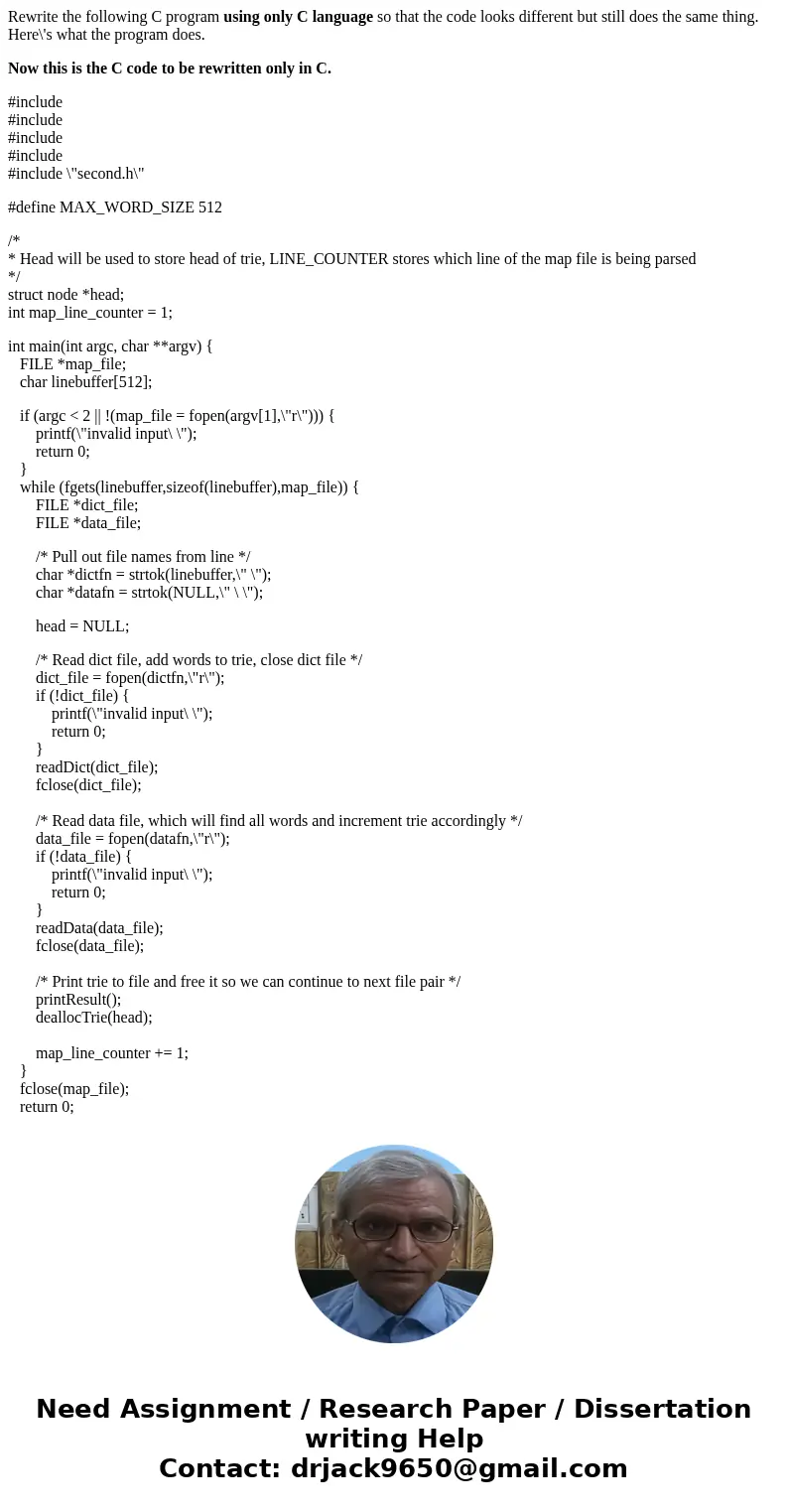
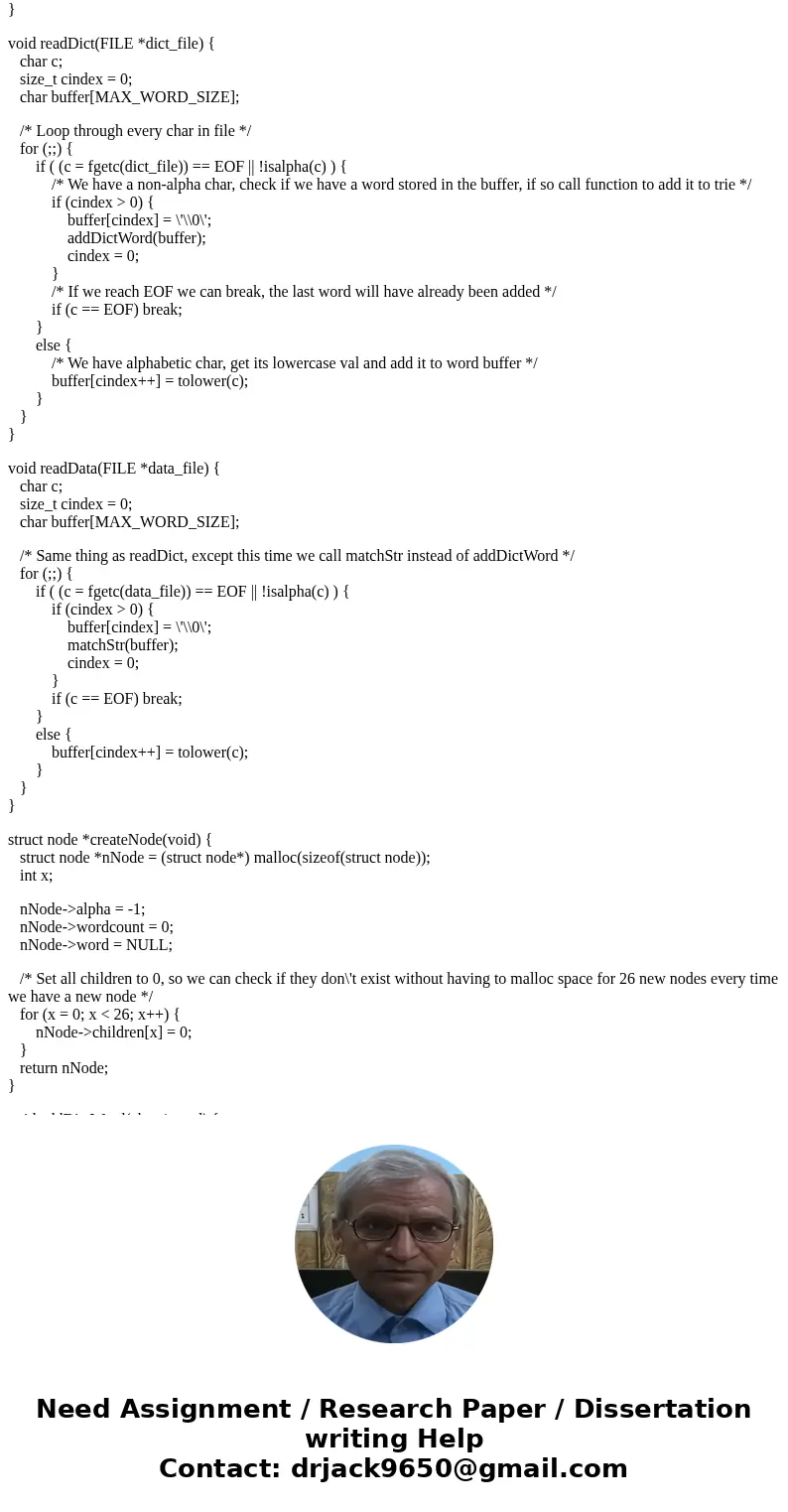
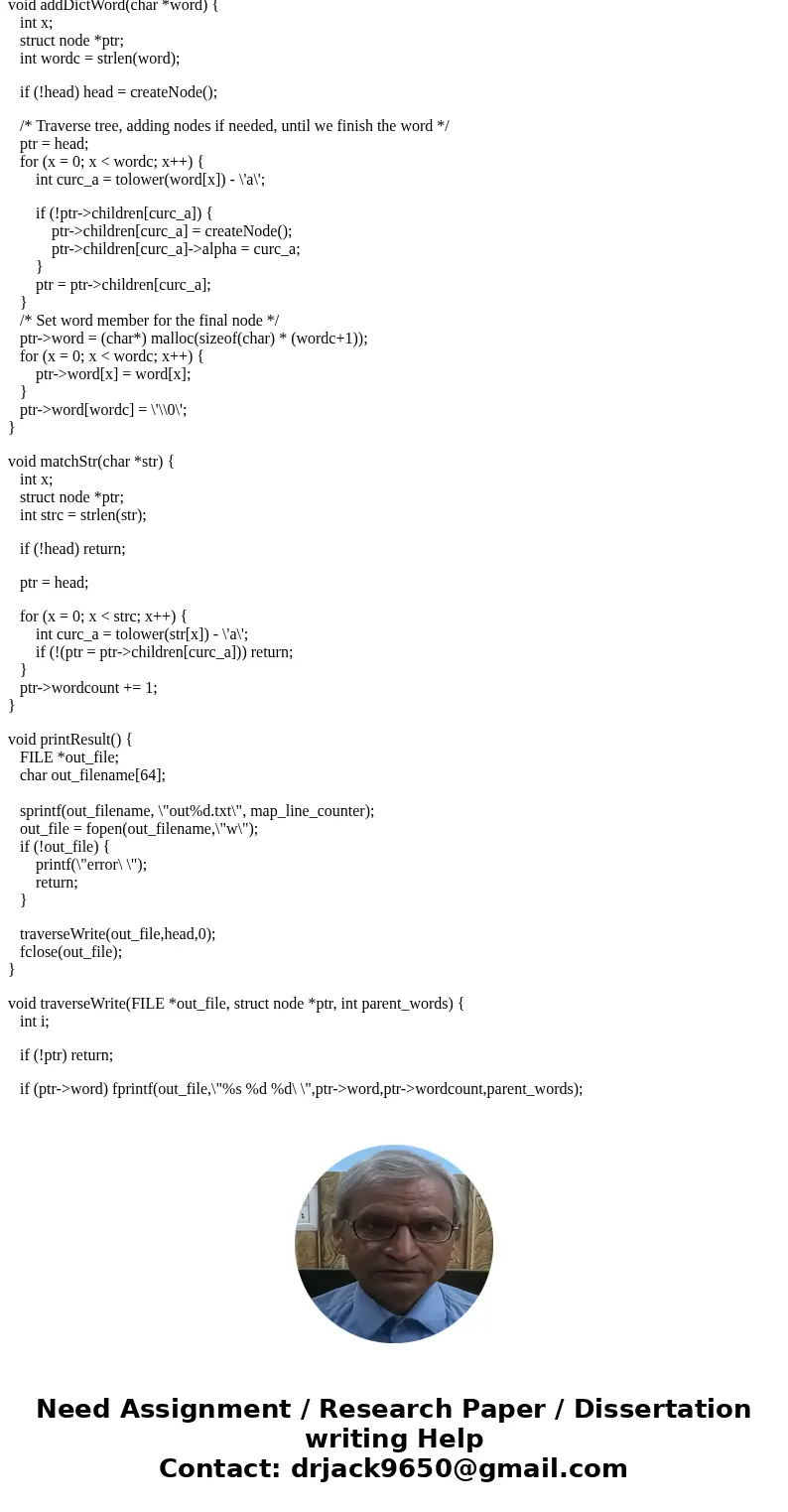
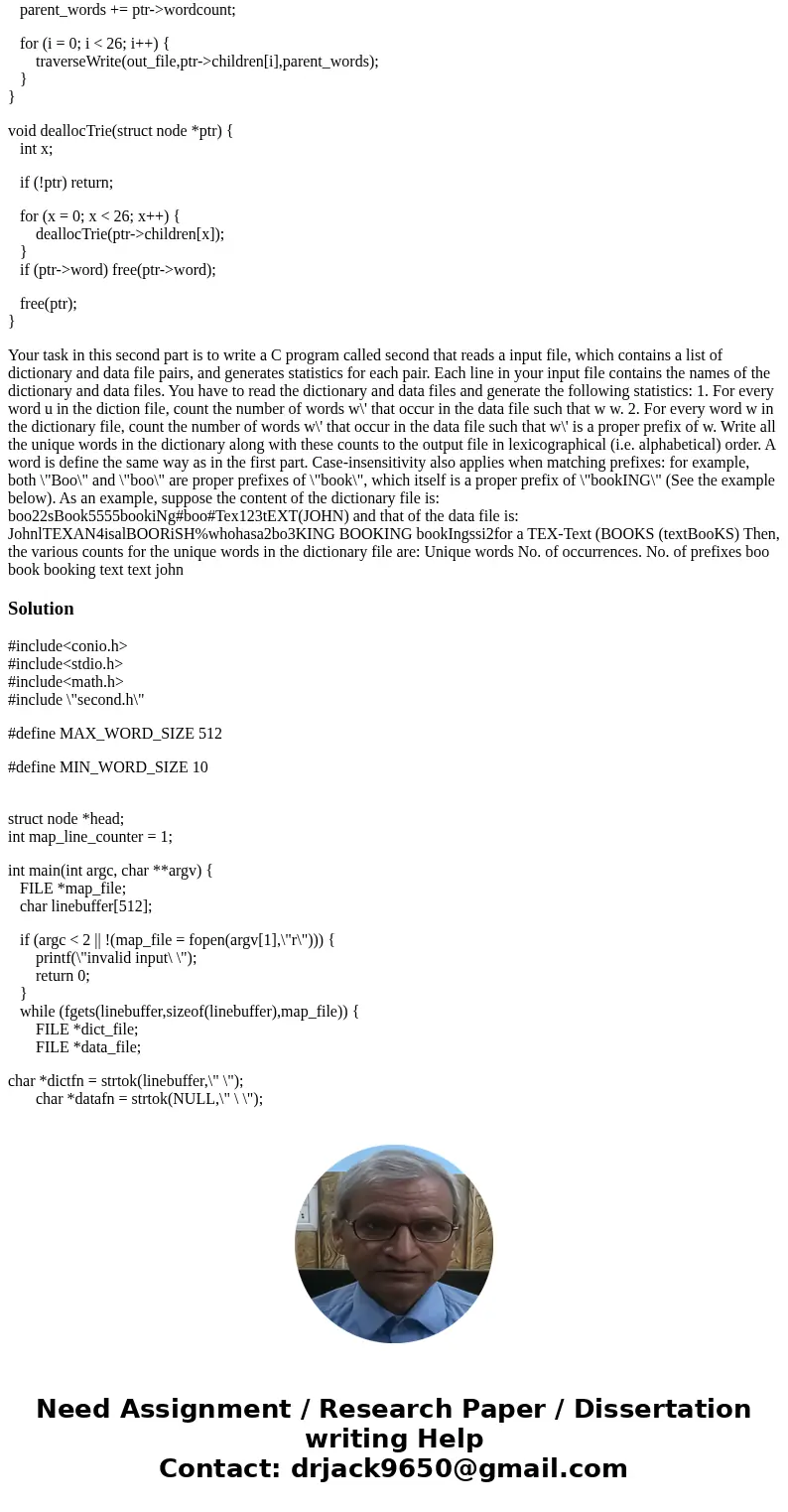
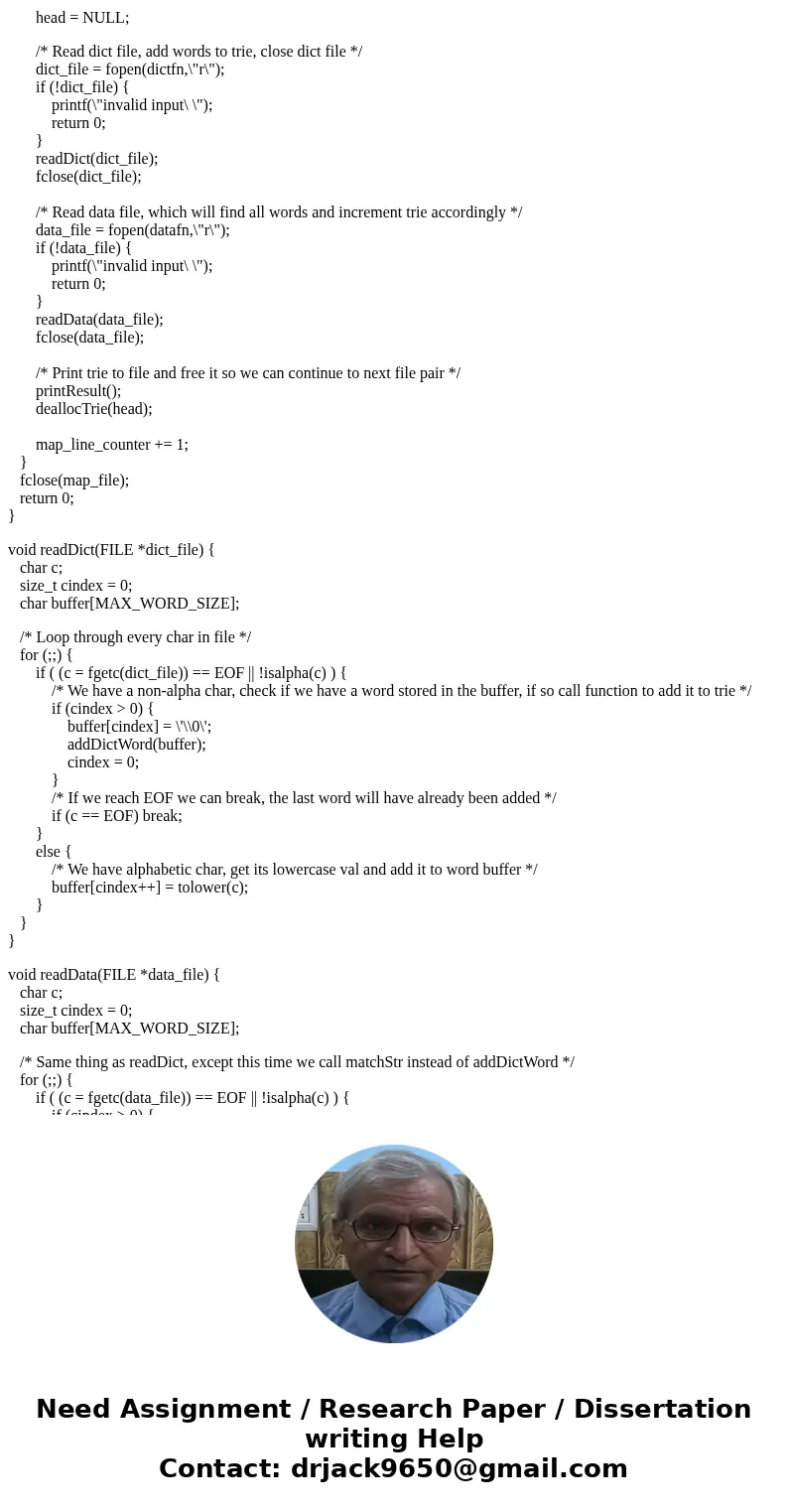
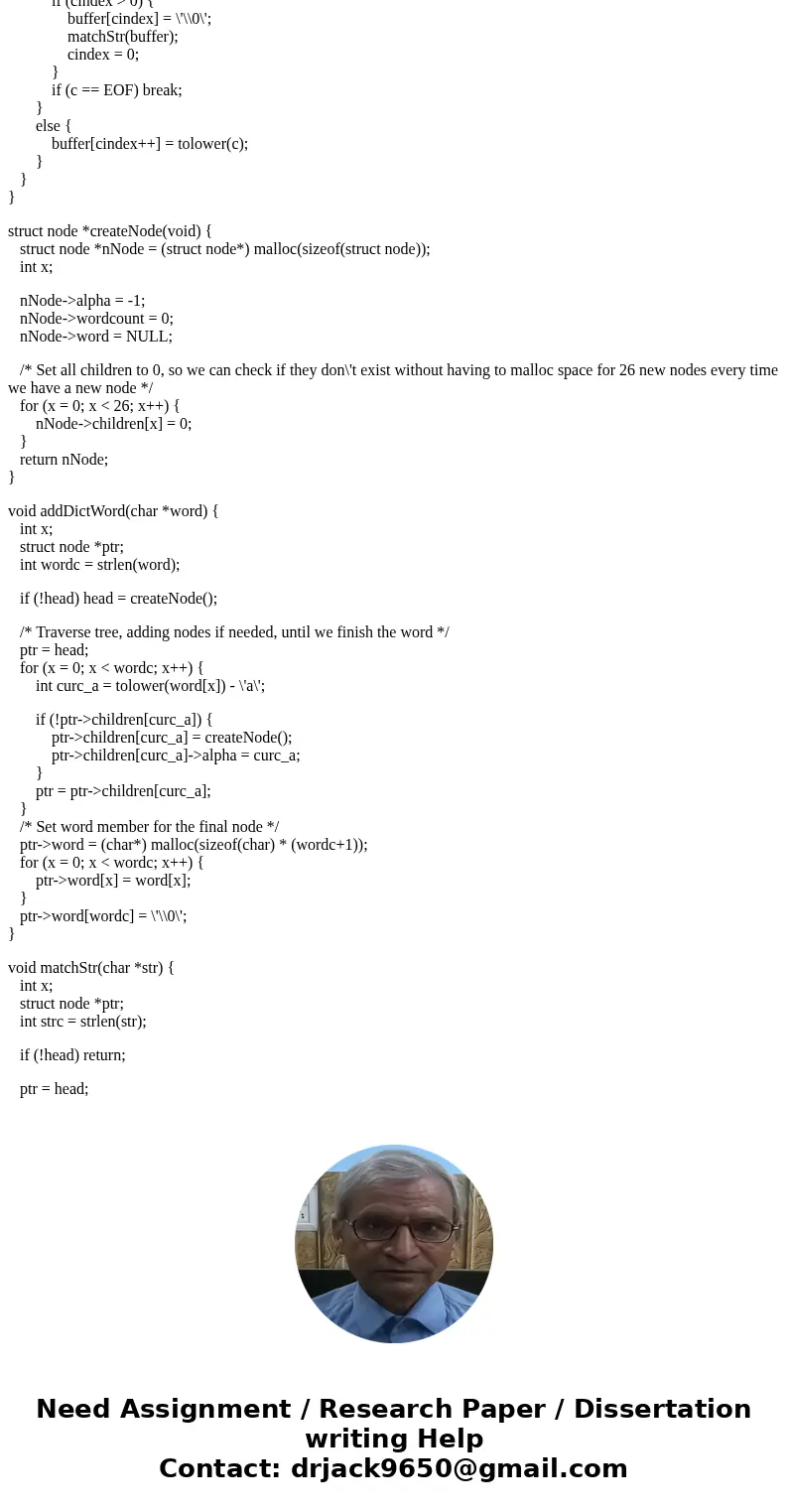
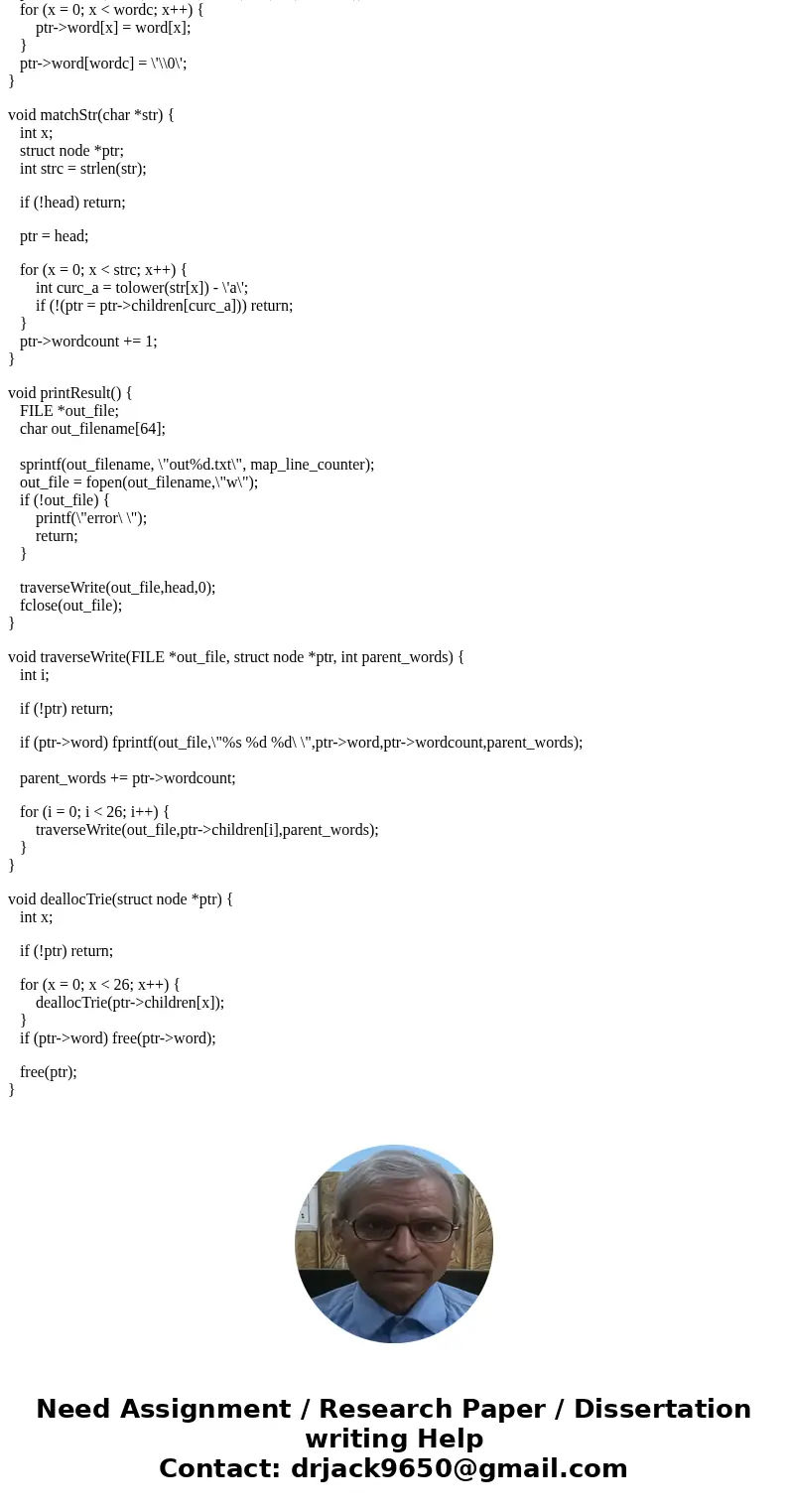
 Homework Sourse
Homework Sourse